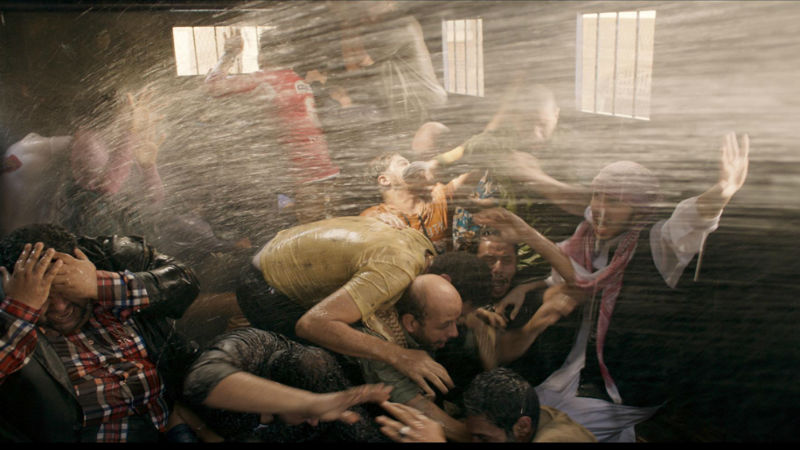




In 2013 the Egyptian military toppled the Muslim Brotherhood faction, two years after the demise of the decade-long dictator Hosni Mubarak. These events are directly linked to the broader movement in North Africa and the Middle East described as the Arab Spring of 2011. While hailed in West as a revolution of the people against autocratic and despotic regimes, the process wasn’t quite smooth (plus the outcome wasn’t always rosy, just think of Syria). Quite the opposite: these events have been fraught with sectarianism. This Egyptian fiction movie brilliantly synthesises these factional activities. It transposes the political tension into a confined space: a police van.
Quite literally, Clash offers an insider’s view into the conflicts that took place in Egypt in June 2013. Virtually all the action in the movie takes place inside the vehicle, and almost all the views of the outside are filmed from behind the bars of the van windows. It’s as if the filmmaker was a fly on the wall. Or an elephant in the room. What I’m saying is that the first-time filmmaker Mohamed Diab succeeds to capture the tension in every corner of a very small space populated with about 15 nervously haggling Egyptians, and yet his camera is never intrusive. There is a sense of claustrophobia and yet the film is never exploitative of the plight of the different characters, a balance difficult to achieve. The camerawork becomes particularly creative towards the end of the movie, when the action takes a very dangerous turn – once again, in the literal sense.

Factionalism and division of all sorts prevail throughout the movie. Prisoners are categorised according to their political allegiance, nationality, job, gender, age and even their beard status. Unsurprisingly, these people argue relentlessly, and it’s not just their temper that’s at boiling point: the van itself is a heat trap for the African sun, and soon the prisoners begin to feel the effects of the extreme temperature.
The movie also has some teething problems, mainly in the script. The high numbers of characters prevents the filmmaker from developing them more thoroughly, and it’s difficult to feel allegiance towards any individuals. Perhaps this was intentional, as at such erratic times it’s indeed very difficult to pick your most reliable sidekick. There are some attempts at what seems to be sort sort of humour and flare, including a fat guy wearing a pan on his head, a man having to urinate in a bottle and a DJ reminescing his music but somehow this come across as a little contrived and awkward. Despite some flaws, Clash remains an effective and memorable movie.
Clash releases in UK cinemas on April 21st, with a few premiere screenings in London taking place before then. Get an idea of the claustrophobic feel and vibe of the movie by watching the film trailer below:






